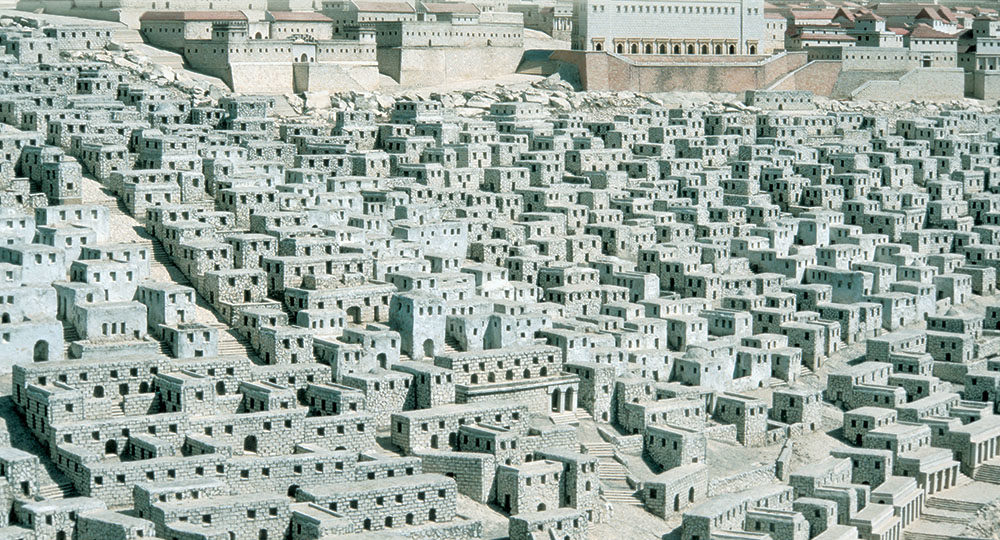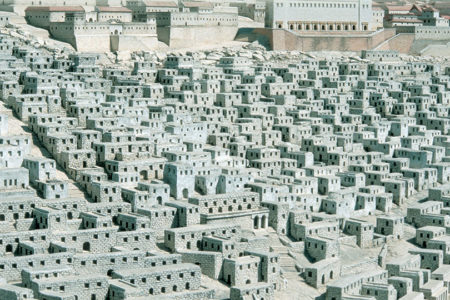The Davidic Covenant
Upon capturing Jerusalem from the Jebusites, King David immediately made it the capital of his empire. Soon afterward, David brought the ark to Jerusalem and erected it in a simple tent within sight of his own cedar palace.
The contrast between the Lord’s humble tent and David’s beautiful cedar house brought conviction on the king. It seemed incongruous that the God whom David served should dwell in a tent, while he resided in a cedar house. Consequently, the king dreamed of constructing a beautiful temple to house the ark of God. But instead, God promised to build a house for David. This promise is contained in what is known as the Davidic Covenant.
Its Circumstance
David wisely confided in Nathan the prophet, “I dwell in an house of cedar, but the ark of God dwelleth within curtains” (2 Sam. 7:2). Nathan instructed David, “Do all that is in thine heart; for the LORD is with thee” (v. 3).
However, the Lord intervened and instructed Nathan to tell David He had never asked anyone to build Him a house, let alone David (vv. 4–7). Nathan was to rehearse David’s life before him, reminding him that God had elevated him from shepherd to king, given him victory over his enemies, and made his name great among the nations (vv. 8–9). Nathan told David that God would provide a permanent home for Israel and give the people rest from all their enemies (vv. 10–11).
Lastly, he conveyed God’s promise to make a house for David (v. 11). Because he shed blood as a man of war, David would not be allowed to build God a house (1 Chr. 28:3).
Its Content
Nathan went on to reveal the major provisions of the Davidic Covenant. They expand and develop the “seed” promise found in the Abrahamic Covenant.
God informed Abraham that Sarah would give birth to a son: “I will bless her, and give thee a son also of her: yea, I will bless her, and she shall be a mother of nations; kings of people shall be of her” (Gen. 17:16). Then He said, “Thou shalt call his name Isaac: and I will establish my covenant with him for an everlasting covenant, and with his seed after him” (v. 19).
Thus the promise would go through Isaac to Isaac’s son Jacob (Gen. 28:13–15), then be narrowed to the tribe of Judah (Gen. 49:10) and finally narrowed further to the house of David (2 Sam. 7:12).
Within the Davidic Covenant are four major promises. They deal with a house, temple, throne, and kingdom.
House. The first promise deals with David’s house (physical descendants). David’s own son would sit on his throne as king of Israel after his death:
And when thy days be fulfilled, and thou shalt sleep with thy fathers, I will set up thy seed after thee, which shall proceed out of thine own body (2 Sam. 7:12).
David’s son Solomon was God’s choice to succeed David as king (1 Ki. 1:30).
Temple. The second promise deals with the temple David wanted to build for God. David would not be allowed to build it; but his son Solomon would: “He shall build an house for my name” (2 Sam. 7:13).
Throne. The third promise deals with the throne (royal authority) of David and Solomon. God said, “I will establish the throne of his kingdom forever” (2 Sam. 7:13, cf. v. 16). The promise is that Solomon’s throne, not his seed, would be established forever. Christ did not come through Solomon’s line, which was cut off at Coniah (Jeconiah). God said of Coniah, “No man of his seed shall prosper, sitting upon the throne of David, and ruling any more in Judah” (Jer. 22:30).
Christ was born of Mary, a direct descendant of David’s son Nathan (cf. Lk. 3:23–31). Joseph, Jesus’ legal father, was a direct descendant of Solomon, through whom the throne legally passed to Christ (cf. Mt. 1:6, 16).
During his lifetime, Solomon fell into sin and was severely punished for his transgression. But the Lord did not dethrone Solomon or take the kingdom from him (1 Ki. 11:1–11), for the sake of his father, David. Neither would God remove His mercy (lovingkindness) from Solomon as He did from Saul.
Kingdom. The fourth promise deals with David’s kingdom: “And thine house and thy kingdom shall be established forever” (2 Sam. 7:16). This pledge did not guarantee that the rule of the Davidic family would be uninterrupted. Although David’s kingdom has been inoperative for centuries, this promise, nevertheless, guarantees its existence forever.
David’s kingdom will be reestablished at a time of God’s choosing (Acts 1:6–7). This promise also guarantees that no other family will ever displace David’s line as the royal family of Israel.
Its Confirmation
Although the phrase Davidic Covenant is not mentioned in 2 Samuel 7, it is evident from other passages in the Bible that God made a covenant with David. This fact is clearly confirmed by the psalmist who wrote,
My covenant will I not break, nor will I alter the thing that is gone out of my lips. Once have I sworn by my holiness that I will not lie unto David. His seed shall endure forever, and his throne as the sun before me. It shall be established forever like the moon, and as a faithful witness in heaven (Ps. 89:34–37).
Numerous Old Testament passages restate and reconfirm God’s immutable covenant with David (2 Sam. 23:5; 2 Chr. 7:18; 21:7; Isa. 9:6–7; Jer. 23:5–6; 30:8–9; 33:14–17, 20–21; Ezek. 37:24–25;
Hos. 3:4–5; Amos 9:11; Zech. 14:4, 9). The New Testament confirms the Davidic Covenant. The angel Gabriel told the Virgin Mary,
And, behold, thou shalt conceive in thy womb, and bring forth a son, and shalt call his name JESUS. He shall be great, and shall be called the Son of the Highest; and the Lord God shall give unto him the throne of his father, David [cf. Acts 2:30]. And he shall reign over the house of Jacob forever; and of his kingdom there shall be no end (Lk. 1:31–33).
Notice, Jesus has the right to David’s house, throne, kingdom, and the house of Jacob. The kingdom promise of the Davidic Covenant was acknowledged by the mother of Zebedee’s sons (Mt. 20:21); confirmed to Christ’s disciples (Lk. 22:29–30; Acts 1:6–7); and reconfirmed at the Jerusalem Council (Acts 15:13–18).
Its Character
Literal. The Davidic Covenant is to be interpreted literally. First, God would make “a great name” for David (2 Sam. 7:9) and give him rest from all his enemies (v. 11); both promises were literally fulfilled in his lifetime. Second, God solemnly confirmed this covenant with an oath to David (Ps. 89:3–4, 33; 132:11), guaranteeing that every aspect of it would be fulfilled literally.
Third, David believed the covenant God made with him would be fulfilled literally (2 Sam. 23:5). His son Solomon believed the promises were literal, especially in relationship to a throne and kingdom (2 Chr. 6:14–16). And the angel Gabriel confirmed an earthly , literal fulfillment of the Davidic Covenant at the announcement of Jesus’ birth to Mary (Lk. 1:31–33).
Unconditional. God clearly says that fulfillment of the promises made in the Davidic Covenant do not depend on David, but on Him. The covenant, therefore, is unconditional.
Throughout Psalm 89, God uses the personal pronoun I to confirm that He and He alone will bring to fruition the covenant promises (Ps. 89:1–4, 20–37). The only reservation in this covenant centers on the chastisement of David’s sons who would succeed him, but the covenant itself would never be abrogated.
Though chastisement disrupted David’s kingly line from the Babylonian Captivity until the birth of David’s Greater Son, Jesus Christ, all the promises made in the covenant have been reaffirmed and will be reestablished at Christ’s Second Coming when He sets up His earthly Kingdom.
Eternal. Scripture calls this covenant an eternal covenant: “And thine house and thy kingdom shall be established forever before thee; thy throne shall be established forever” (2 Sam. 7:16; cf. 2 Sam. 23:5; Isa. 55:3; Ezek. 37:25).
Immutable. The Davidic Covenant is also unchangeable. It is based on the nature and character of God, who is immutable, meaning there is no variableness or change with Him. Thus the promises in the Davidic Covenant are immutable, since they were decreed by God. And they will come to fruition in the way and time that the Lord has predicted in Scripture.







You need to read Judah’s Scepter and Joseph’s Birthright by Rev JH Allen.
It a very interesting study and love to know more about your ministries
Is it true that the tent David pitched for the ark, didn’t have a veil separating the ark from unsanctified people? Why did Solomon choose to go to the Mosaic Tabernacle at Gibeon rather than seek God at the tent in Jerusalem where the ark was found?